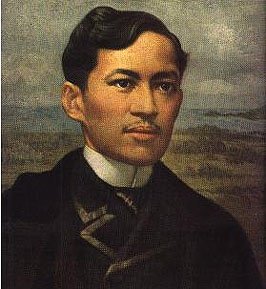Jose Rizal Day is December 30 in the Philippines
Jose Rizal, a Filipino physician, novelist, and the national hero of the Philippines and pride of the Malayan race, was born on June 19, 1861, in the town of Calamba, Laguna.
He was the seventh child in a family of 11 children. Both his parents were educated and belonged to distinguished families. At a young age, he astounded his family and relatives by his pencil drawings and sketches and by his moldings of clay. At the age of 8, he wrote a Tagalog poem, "Sa Aking Mga Kabata," the theme of which revolves around the love of one’s language. In 1877, at the age of 16, he obtained his Bachelor of Arts degree with an average of "excellent" from Ateneo Municipal de Manila.
In the same year, he enrolled in Philosophy and Letters at the University of Santo Tomas, while at the same time took courses leading to the degree of surveyor and expert assessor at Ateneo. He finished the latter course on March 21, 1877 and passed the Surveyor’s examination on May 21, 1878.
Jose Rizal studied medicine in Madrid and Paris and later in Germany, where he published his novel Noli Me Tangere - The Lost Eden (1887), attacking the evils of Spanish rule in the Philippines. This and a second novel, El Filibusterismo (The Subversive) (1891), won him wide recognition and helped spark a reform movement in the Philippines.
In the hope of securing political and social reforms for his country and at the same time educate his countrymen, Jose Rizal, the greatest apostle of Filipino nationalism, published, while in Europe, several works with highly nationalistic and revolutionary tendencies.

In March 1887, his daring book, Noli Me Tangere, a satirical novel exposing the arrogance and despotism of the Spanish clergy, was published in Berlin; in 1890 he reprinted in Paris, Morga’s Successos De Las Islas Filipinas with his annotations to prove that the Filipinos had a civilization worthy to be proud of even long before the Spaniards set foot on Philippine soil.
On September 18, 1891, El Filibusterismo, his second novel and a sequel to Noli Me Tangere and more revolutionary and tragic than the latter, was printed in Ghent. Because of his fearless exposures of the injustices committed by the civil and clerical officials, Jose Rizal provoked the animosity of those in power. This led himself, his relatives and countrymen into trouble with the Spanish officials of the country.
As a consequence, he and those who had contacts with him, were shadowed; the authorities were not only finding faults but even fabricating charges to pin him down. Thus, he was imprisoned in Fort Santiago from July 6, 1892 to July 15, 1892 on a charge that anti-friar pamphlets were found in the luggage of his sister Lucia who arrived with him from Hong Kong. While a political exile in Dapitan, he engaged in agriculture, fishing and business; he maintained and operated a hospital; he conducted classes and taught his pupils the English and Spanish languages.
The authorities then exiled him to the island of Mindanao. When a Filipino revolt broke out in 1896, Jose Rizal was accused of having inspired it. After a mock trial, he was convicted of rebellion, sedition and of forming illegal associations. In the cold morning of December 30, 1896, Rizal, a man whose 35 years of life had been packed with varied activities which proved that the Filipino has capacity to equal if not excel even those who treat him as a slave, was shot at Bagumbayan Field.
Jose Rizal is honored as a national hero in the Philippines.
His exceptional accomplishments in science, literature, history, medicine, and political philosophy, in addition to his being a martyr, has established him as number one and without equal in the history of Philippine national heroes.


